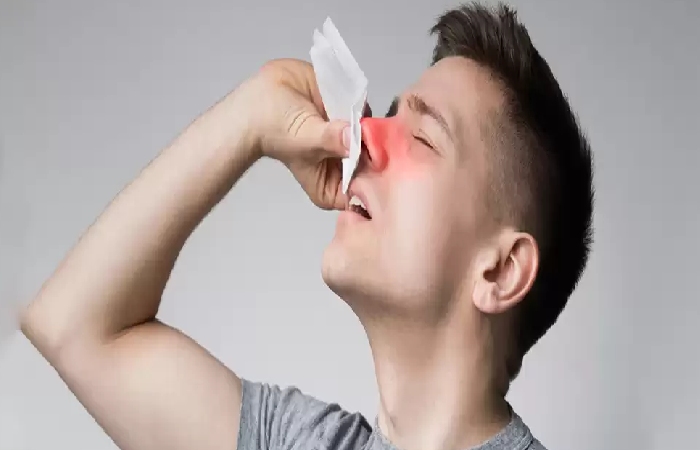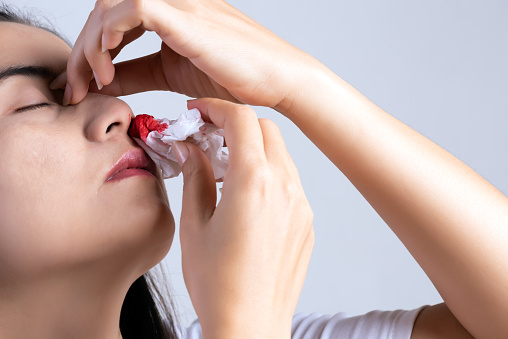The nose has small blood vessels that usually bleed when the nose has dried out. If you blow or pick your nose frequently, there is a likelihood that you’ll start to Nosebleeds.
If your nosebleeds once, there is no need to worry. However, if the nose bleeding persists, you should seek some help from a Philadelphia ENT doctor.
We’ll now look into how you can prevent a nosebleed.
Table of Contents
How Do You Stop a Nosebleed?
If you’re nose bleeding, the following tips come in handy, and they help to stop or minimize the bleeding.
1. Spray a Decongestant in the Nose
There are different decongestant sprays in the market, including Afrin. The decongestants help to tighten the blood vessels. By relieving the congestion and inflammation, the bleeding will stop progressively. The spray should be applied to the affected nostrils.
2. Resist the Need to Prick Your Nose
Some individuals usually stick tissues, cotton pads, and tampons inside the nose to ease the bleeding. By handling the issue in such a manner, you’ll irritate the blood vessels even further, and the bleeding won’t stop. It is advisable to use a damp washcloth or tissue to prevent bleeding.
3. Pinch the Nose
When you pinch the nose softly for at least 10 minutes, the blood vessels will compress, and the bleeding will stop. Even if the pressure persists, you should not let go, or else the bleeding will continue.
4. Lean Forward and Seat Upright
You may be tempted to lean back when you start to nosebleed. The main focus is on ensuring the blood won’t drip down from your face. It is advisable to lean forward slightly.
According to ENTs, leaning forward will ensure the blood doesn’t flow towards the throat. If the blood flows towards the throat, you’ll start vomiting and choking. You should breathe through your mouth and ensure you’re calm throughout the entire period.
5. Repeat Each of The Steps Listed Above
It is advisable for the people whose nose bleeding persists to apply more pressure for at least 10 more minutes. At times, the decongestant can be soaked in a cotton ball and placed into the affected nostril. After 10 minutes, you can confirm whether the bleeding has stopped.
If the bleeding persists, feel free to seek the services of an ENT.
What Should You Do After a Nosebleed?
After the bleeding has stopped, there are some after-care tips that you should consider, and they include:
1. Don’t Blow the Nose
You may be tempted to blow your nose to get rid of the dried particles that come about after a nosebleed. Avoid blowing your nose in such instances. If you want to blow your nose, you should do so after 24 hours. When you blow your nose, you should do so gently.
2. Use an Ice Pack
You can place an ice pack covered with clothes on the nose since it’ll help to tighten the blood vessels. By doing so, you can also relieve the inflammation if the nose bleeding resulted from an injury. Never leave the ice pack for over 10 minutes since your skin might incur some injuries.
3. Don’t Pick the Nose
If you pick your nose frequently, the nasal membranes will be irritated. If you were nose bleeding, there is a high likelihood that when you pick your nose, you’ll start to nosebleed again.
4. Avoid Bending Down
When you bend down or handle activities that will force you to strain, you may end up nose bleeding. You should handle light activities for the next 24 hours after a nosebleed.
How do you prevent a nosebleed?
The following tips can help to prevent a nosebleed:
1. Trim your fingernails
If you have sharp and long fingernails, you should trim them, especially if you recently had a nosebleed. At times, you’ll pick your nose, and you won’t think about it. The long fingernails will increase your chances of a nose bleed, which is why they should be trimmed.
2. Wear Protective Equipment
For people who have a history of nose bleeding and engage in different sports, there is a high likelihood of experiencing a physical injury, so it is advisable to wear protective equipment.
A transparent mask comes in handy, and it can be placed over the nose. The mask will absorb all the potential blows, and the likelihood of nose bleeding will reduce.
3. The Nose Lining Should be Moist
If the mucus membranes are dry and you end up inhaling dry air, you will experience some irritation, and you may end up nose bleeding. You can use a saline spray to ensure the membranes are moist. The spray can be applied after every two hours. Nasal gels can also be used as an alternative for those who don’t prefer sprays.
4. Use a Humidifier
Humidifiers help ensure the air is moist; thus, the mucus membranes won’t dry out. You can also use a humidifier when sleeping if you want to prevent nosebleeds. Ensure the humidifier is cleaned regularly such that you can adhere to the instructions issued by the manufacturer. Regular cleaning is advisable since the moisture and heat can attract mold and bacteria.
When Should You See a Doctor?
If you nosebleed occasionally, there is no cause for alarm; however, if you nosebleed at least twice a week. You should also be worried if the nosebleeds persists for more than 30 minutes. It is advisable to consult an ENT (ear, nose, and throat) specialist.
The physician will examine the nasal passages and the nose to determine the cause of the unusual bleeding. Some of the causes may include a foreign body, small nasal polyps, and blood vessels that are excessively large.
Some of the approaches a physician can use to handle the nose bleeding issue include:
- The use of medication: the doctor will issue a patient medication-soaked cotton. The medication will stop the bleeding and ensure the blood will clot.
- Cautery- the approach normally uses chemical substances or heat to seal the blood vessels such that the bleeding will stop.
- Trauma correction- if the nose is broken or a foreign object is stuck in the nose, the doctor will get rid of the object and ensure the fracture has been corrected.
Nosebleeds can pose a major issue, which is why you should consult an ENT fast. They will examine the cause of the frequent nosebleeds and treat the condition accordingly.


